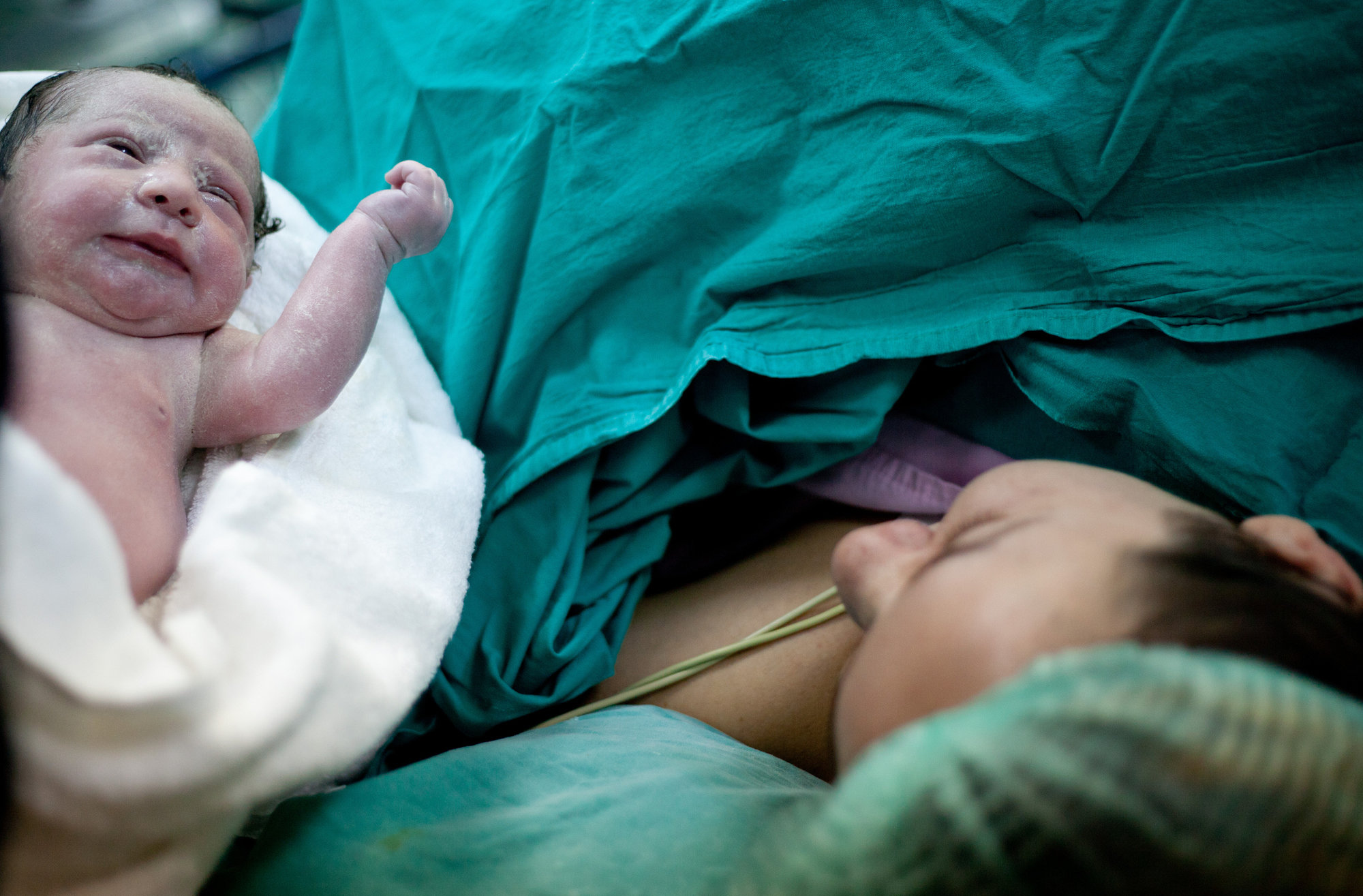
As COVID-19 continues to spread like wildfire across the globe, experts are quickly trying to learn more about the virus, in hopes of stopping it in its tracks. So far, we know that the elderly are sadly at a much higher risk of dying from the disease than the rest of us, as well as those with pre-existing conditions. We also know that children seem to have lower rates of contracting the illness (though some experts theorize they may be silent carriers). And now, reports are surfacing that babies born via C-section may actually be less likely to catch the coronavirus.
The news comes from a recent Chinese study, which found that mothers with COVID-19 who gave birth via C-section did not transmit the disease.
At least, not to their offspring.
The case study looked at 12 infants born by C-section in Wuhan, China — the epicenter of the outbreak. None of the babies exhibited symptoms of COVID-19, even though their mothers were infected by the illness, scientists say.
According to the Daily Mail, doctors have known for some time that babies can be exposed to viruses carried by the mother while traveling through the vaginal canal, so it's not too far-fetched that C-section deliveries may lower this risk.
It's important to keep in mind, however, that this study was small.
In fact, the findings are the result of two separate investigations.
The most recent one, the Daily Mail noted, analyzed four babies born to infected mothers at Wuhan Union Hospital. Only one of them was born vaginally to a mother with COVID-19, though ultimately the baby did not contract it. In all four of these cases, doctors immediately isolated the children in the NICU, which may have been key.
In other words: The study results are not perfect, and there's still a lot more we need to learn about the virus before we draw any real conclusions.
But perhaps, at least for now, they may be of small comfort to mothers who expect to undergo a C-section delivery soon.
"Only one pregnant mother adopted vaginal delivery because of the onset of the labor process," Dr. Yalan Liu of Huazhong University told the newspaper. "The baby was normal. Maybe vaginal delivery is OK. It needs further study."
The study follows news from Monday, which revealed that a baby born in London was confirmed as the youngest known coronavirus patient.
The child was reportedly born to a mother who was unaware she was infected. In that case, it is not immediately known how the mother gave birth to know if it confirms the study's findings.
Doctors also aren't sure whether the virus was contracted in the womb or shortly after delivery, according to LiveScience. As of now, the Centers for Disease Control and Prevention admitted that it's unclear whether pregnant women are even more susceptible, like they are with the flu:
"Pregnant women experience immunologic and physiologic changes which might make them more susceptible to viral respiratory infections, including COVID-19. Pregnant women also might be at risk for severe illness, morbidity, or mortality compared to the general population as observed in cases of other related coronavirus infections [including severe acute respiratory syndrome coronavirus (SARS-CoV) and Middle East respiratory syndrome coronavirus (MERS-CoV)] and other viral respiratory infections, such as influenza, during pregnancy."
The federal agency adds that the virus has not been detected in breast milk.
"Person-to-person spread is thought to occur mainly via respiratory droplets produced when an infected person coughs or sneezes, similar to how influenza (flu) and other respiratory pathogens spread," the CDC website noted.
However, "we do not know whether mothers with COVID-19 can transmit the virus via breast milk," it continued.
For now, pregnant and new mothers are urged to follow the same sanitary practices as others to avoid the coronavirus.
Those include regular hand washing (of 20 seconds or more), limiting exposure to surfaces that might carry the germs of others (and when you do, consider wearing gloves or wiping it clean with an antibacterial wipe), and avoiding contact with others who are sick.
If you need to sneeze, try creating a "cough pocket," as opposed to coughing into your hands, and stay home as much as possible to limit your exposure to others who may be carriers of the illness.
The more you can do now, the better, experts say.
"[Americans] should be prepared that they're going to have to hunker down significantly more than we as a country are doing," said Dr. Anthony Fauci, director of the National Institute of Allergy and Infectious Diseases, on Sunday's episode of Meet the Press.
"I would prefer [we shut down] as much as we possibly could," he added. "I think we should really be overly aggressive and get criticized for overreacting."




